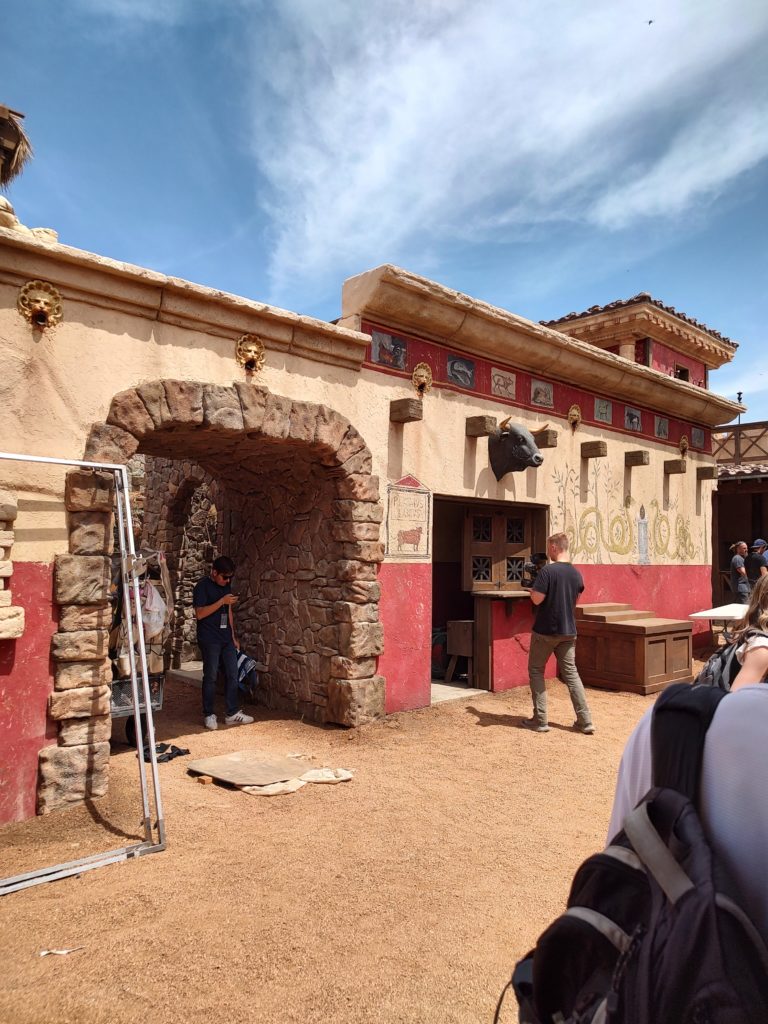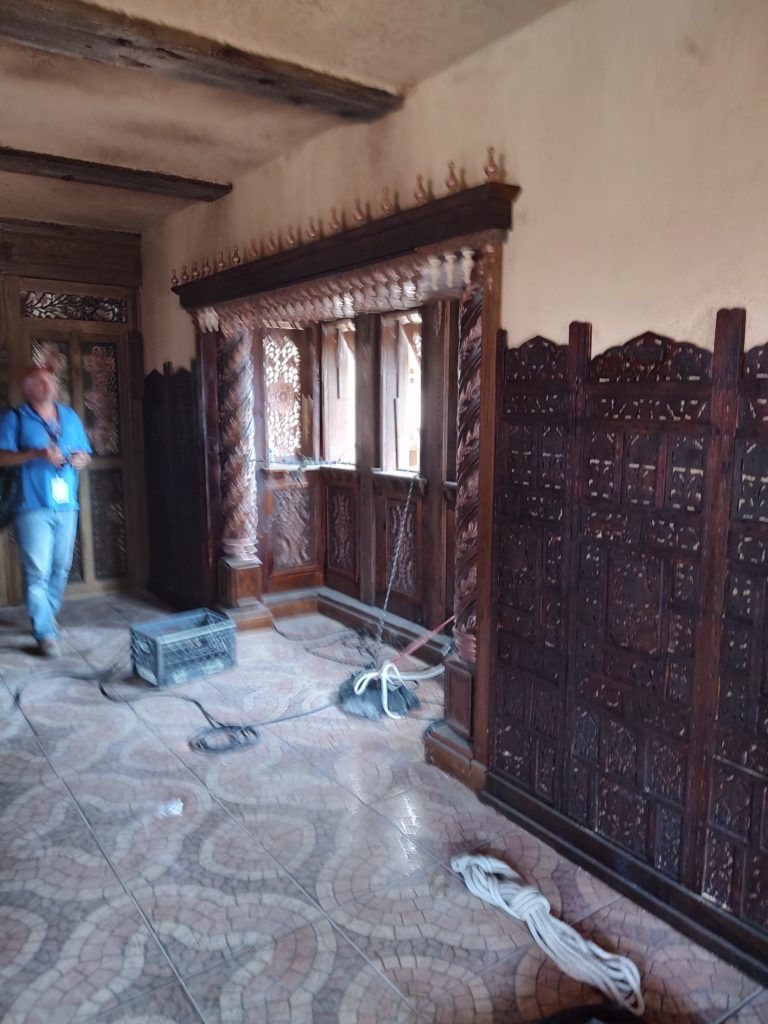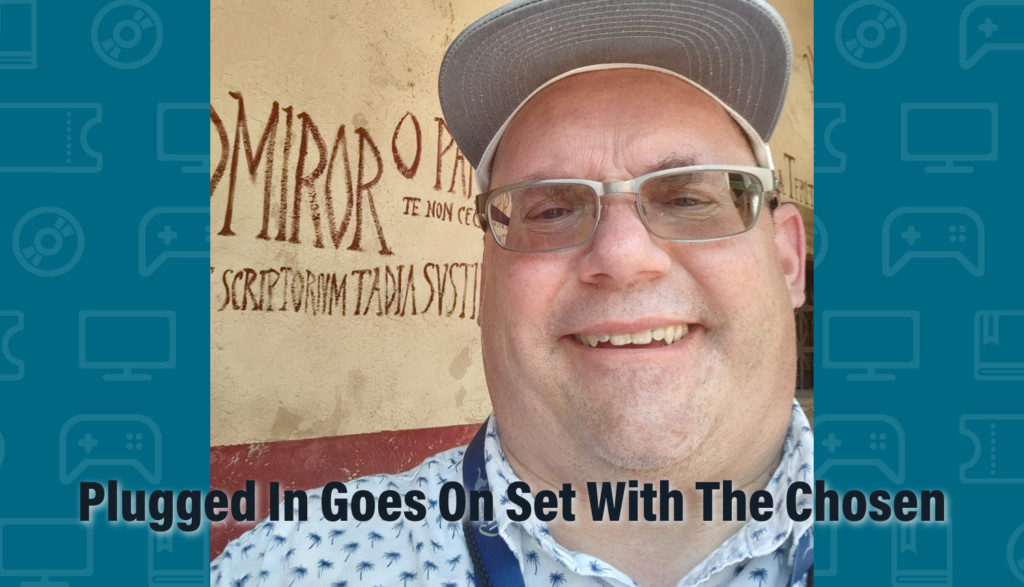If you’re a fan of Dallas Jenkins’ The Chosen, you probably don’t need me to tell you that Season 3 debuts this week. The first two episodes of the new season will be screened in theaters in conjunction with Fathom Events from Nov. 18 to Nov. 22.
Jenkins’ show, which has a planned story arc of seven seasons portraying the life of Jesus and His followers, has generated a remarkable global following since its debut in 2017. The show’s pioneering “pay it forward” crowdfunding model in partnership with Angel Studios has been a huge success. It has trailblazed an entirely new way to finance productions, with more than $5 million generated from individuals’ donations.
To give you a sense of what to expect in the new season’s ongoing portrayal of Jesus’ ministry, you can check out the trailer below.
I recently had a chance to visit the third-season set of The Chosen in Midlothian, Texas, outside of Dallas. There, the production’s skilled artists and designers have crafted a multi-use set, in conjunction with an enormous soundstage, that will be home to about half of the season’s scenes.


And here’s a long explanation (complete with some joking about our group not yet having a bathroom break that afternoon) of the amazing soundstage:
I also had opportunity to interact with a number of cast members and other key participants in The Chosen, including writers Ryan Swanson and Tyler Thompson, along with actors Elizabeth Tabash (Mary Magdalene), Lara Silva (Eden, Simon Peter’s wife) and Amber Shannon Williams (Tamar, the Ethiopian Woman). Each of them talked about what sets The Chosen apart from other depictions of Jesus’ life, as well as how the show has space to imagine and unpack what the lives of these familiar biblical characters might have been like.
One of the criticisms of The Chosen we’ve occasionally heard at Plugged In has to do with this latter approach, that the filmmakers are taking dramatic license in ways that flesh out these characters beyond what we see in the Bible. We thought it would be interesting for you to hear how some of those involved with the story respond to that concern.
Writer Tyler Thompson noted that one advantage a long production run has over movies and even miniseries is providing the narrative space to flesh out these characters.
“Usually, if it’s a movie, they’re trying to cram four Gospels and three years’ worth of events into 120 minutes,” he noted. “Or if it’s an Easter-season miniseries, you’re still taking four books, three years of events and a lot—we have like 17 main characters with arcs and personalities. And you can’t squeeze all of that into five episodes of a miniseries without it feeling rushed, flat, just repeated straight from Scripture. And it’s fine to do a repeated-straight-from-Scripture thing, that’s just been done. So, we’re doing something new, which is saying, ‘OK, people have done the Gospel According to John word for word. We would like to look in between the lines of Scripture. What’s going on with these characters?’ I think that’s what makes it different.”
Tyler went on to use the metaphor of hanging a picture to help people understand the creative team’s storytelling approach.
“We call it plausible fiction,” he says. “Because if we call it anything else, that would be wrong. I think of, you know, when you’re trying to hang a picture on a wall, and if you don’t have a stud finder, you’re knocking on the wall for the resonant spaces. So, I think of the verses and the text as the studs of this building, of this structure. It’s like, “OK, that’s a solid thing. We know that Simon said to Jesus, “Lord, we’ve been fishing all night, and we caught nothing.” So, we go back and we ‘knock’ a little bit. And there’s a hole, there’s a resonance. Why was he out on the water all night? And then that’s a space where we say, “Oh, we know we can fill that with something.”
Head writer Ryan Swanson adds, “There is a level of reverence in some of the other portrayals that I’ve seen, [but] the characters move like ‘plot bots.’ We call them plot bots when there are unmotivated movements, decisions—characters have to end up in a certain place to be there because that was what was written. We explore the reasons of why they may have made those decisions. Or, just in the most basic sense of drama, characters [are] faced with a binary decision: yes or no, stay or go, fight or flee, under the pressure of life and the context we’ve described. So, if we can understand their lives, and we know what decision they make, we can find a way to make that dramatic. And Dallas [Jenkins] has made it OK for us to do that. And he’s introduced an idea that audiences can understand that we’re taking faithful movements within the text. We’ve come from a space of complete belief, and we want to do it well. We don’t have ulterior motives. There’s no agenda. We just want [these characters] to be as real as they feel to us.”
Actresses Lara Silva, Amber Shannon Williams and Elizabeh Tabash also provided insight into what it is they think sets The Chosen apart from other movies about Jesus and His followers. One word that came up again and again was this: humanity.
Silva, who plays Peter’s fictional wife, Eden, said, “We stay true to Scripture, while still having the imagination that I think God calls us to have with creating. And it fills in between the lines and makes the Scriptures come to life before your eyes. And the humanity behind it, too. Just so many reasons. Jesus, the disciples were all humans. And we really bring that out in all of it.”
Williams emphasized the humanity inherent in the storytelling as well. “I play Tamar on the The Chosen, also known as the Ethiopian woman who brought the paralytic to Jesus to be healed. … The Chosen does that [shows a biblical character’s ongoing, imagined growth] for a lot of the stories that we grew up listening to and hearing about, and Bible school, Bible study. We know they happened. But the individuals that are a part of it, maybe not even mentioned by name, The Chosen is giving them all a story now. They’re all having a dynamic, human existence and representation.”
Williams believes this emphasis on the many characters’ fears, foibles and flaws is key to its appeal. “It’s so relatable on a human level,” she says. “That’s the major difference. You have a lot of stories about Jesus. And you have Him so ethereal and sometimes unrelatable. [We see] Him brushing His teeth. What Jesus or faith-based film have you seen [where] Jesus is brushing His teeth? … There are so many disciples, and each one is different. So, you get to see that from each person’s perspective. And when you watch that as a viewer, you’re like, ‘I can relate to that. That’s my brother, that’s my sister, that’s my mom, you know?’ … Look at all these imperfect people who were chosen to be His disciples.”
Tabash, who plays the core character of Mary Magdalene, echoes her fellow actresses’ thoughts regarding the show’s gritty realism and its ability to connect with our real-world struggles today.
“I think the mistake of a lot of Bible stories in the past is that they’ve been very sanitized for the audience,” she said. “There’s this very clean, stoic, everyone’s like British, somehow. Everyone’s already saints. Mary Magdalene’s already a saint. Everyone’s fixed already. And I think what The Chosen does is make it so human.”
Tabash continues, “These characters are so flawed, and so human, and really gritty. There’s like fist-fights and bars and drinking. You know, there’s blood in the story. There’s real human problems and real human flaws that are not pretty, and not sanitized and not polite. And I think that’s actually what people are relating to. It’s recognizing themselves and identifying themselves in these characters, because they are also flawed and they’re all so—you know, life is gritty. It’s not sanitized. It’s not clean and perfect, and nobody’s a saint, you know? We’re all struggling and trying, and I think witnessing these characters doing the same is sort of a relief. If someone like Mary, who is growling on the floor with blood all over and, you know, screaming at a Pharisee. If she can be redeemed and saved and loved deeply by Jesus, then any of us can, you know?”
And if you want to know more about each of these episodes as they arrive, be sure to check out Plugged In’s full reviews of them starting later this week.





Recent Comments